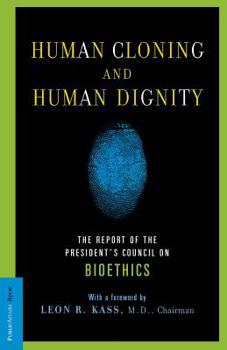Human Cloning and Human Dignity: The Report of the President's Council on Bioethics
Select Format
Select Condition 
Book Overview
Few avenues of scientific inquiry raise more thorny ethical questions than the cloning of human beings, a radical way to control our DNA. In August 2001, in conjunction with his decision to permit... This description may be from another edition of this product.
Format:Paperback
Language:English
ISBN:1586481762
ISBN13:9781586481766
Release Date:October 2002
Publisher:PublicAffairs
Length:400 Pages
Weight:1.05 lbs.
Dimensions:1.1" x 5.6" x 8.6"
Related Subjects
Administration & Medicine Economics Biological Sciences Biotechnology Ethics & Morality Evolution Genetics Health Care Delivery Health, Fitness & Dieting Health, Fitness & Dieting History & Philosophy Medical Ethics Medicine Philosophy Politics & Social Sciences Science Science & Math Science & Scientists Science & TechnologyCustomer Reviews
4 ratings
A balanced considerate report with strong reasons for opposing human cloning
Published by Thriftbooks.com User , 17 years ago
There is a great deal of information provided in this report on the subject of human cloning. There is also a fundamental argument at the heart of the discussion concerning whether human cloning is advisable or not. I tend to agree with the line of thinking of the Chairman of the Comission Leon Kass, who basically argues that human cloning is incommensurate with human dignity, and the future benefit of mankind. At the heart of such a perception is a belief that limitation is wisely built into the human situation. And that an opening up of 'reproduction' in this way will ultimately undermine our common humanity. 'Cloning' would probably lead to a promotion of a false hope of immortality on the part of those who could afford to have themselves have themselves cloned many times. It will lead to an undermining of our whole sense of family life, and human relations.
Very powerful.
Published by Thriftbooks.com User , 19 years ago
I am a science major and philosophy minor and I have found this book very provocative, well written and useful.
A Different Perspective on Cloning and Stem Cell Research
Published by Thriftbooks.com User , 20 years ago
I found this report to be invaluable in determining where some in the scientific community and many politicians and bureacrats stand on the subject of cloning and stem cell research. If you favor such research, for whatever reason, whether it be the development of tissues for the cures of disease or for other reasons, the Human Cloning and Human Dignity report will definitely give you an idea regarding the ideology of those who composed the report. The position of many of the members is common and frequently theological in nature, with much of the discussion concerning the subject of the earliest cell divisions, before recognizable human features have developed.The position against human cloning in the report is recognizable, honest, and thorough so someone hoping to change public opinion in favor of cloning and stem cell research can determine what they need to do to address public opinion on the subject. I found the report very informative.
A Balanced Appraisal
Published by Thriftbooks.com User , 21 years ago
This book is the result of a special inquiry ordered by US President Bush to examine these contentious issues. Late in 2001 he announced the formation of a bioethics council to weigh into the many related issues involved in the cloning debate. Chaired by bioethicist Leon Kass of the University of Chicago, a panel of experts was quickly convened, and after 6 months of research and reflection, this final report was presented to the President in July 2002.This 350-page book presents the findings of the Council. The Council was comprised of 18 experts in science, medicine, public policy and ethics. Some were secular, some religious. Some were fully against any form of human cloning - even for research purposes - while others were much more open to therapeutic research involving embryos, whether deliberately created for that purpose, or "surplus" from assisted reproduction programs. The majority however seem quite concerned about all types of human cloning.The report begins with an overview of the debate, including scientific, historical and ethical components. Terminology is also clearly defined. Then the pros and cons of the ethics of reproductive cloning are examined in detailed. Similarly, the ethics of therapeutic cloning, both for and against, are closely discussed.The book concludes with public policy options and recommendations. Finally, thirteen Council members contribute personal statements on the proceedings. These include William Hurlbut, Charles Krauthammer, Gilbert Meilaender and William May. In these statements the various authors are allowed to express personal preferences, disagreements, or endorsements of the Council report. Many of these alone are worth the price of the book.But as I mentioned, the great majority of Council members seem to have a strong ethical basis on which they make their pronouncements. Thus the report, while allowing various sides to be heard, often gives room for extensive moral reasoning and reflection.For example, in the discussion on cloning for research, the Council acknowledges that we should not ignore the needs of the suffering, but even this must be kept in balance: "the relief of suffering, though a great good, is not the greatest good". It continues, "As highly as we value health and longer life, we know that life itself loses its value if we care only for how long we live, and not also for how we live."On the issue of the moral status of the human embryo, again, differing points of view are expressed. But it does deserve special respect, and should not be treated as a means to another's end. It is more than a clump of cells, and it clearly is the means by which all of us began. The report recommends that all embryo research be subject to a new and thorough review and be part of a larger regulatory scheme.Because this report is a collection of viewpoints, and an assemblage of differing options and proposals, it cannot come out with clear-cut and definite conclusions. But the overall direction and ton




